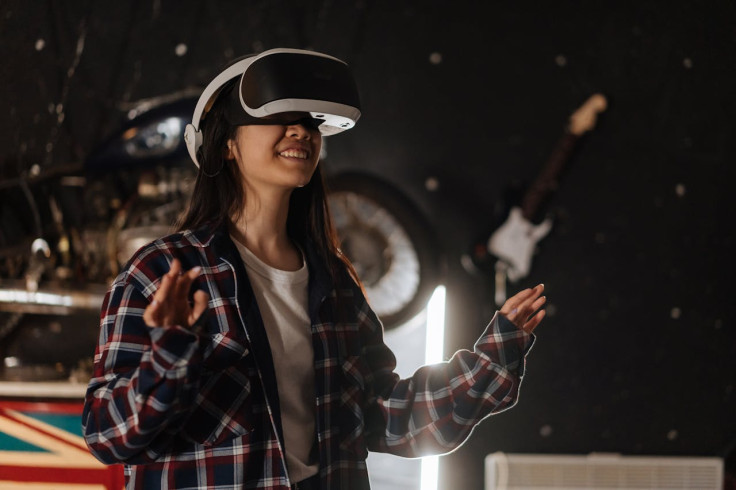Revolutionary AI Technology Rekindles Connections with Departed Loved Ones
Somnium Space is testing "live forever mode" at HQ

A virtual reality tool dubbed "Live Forever Mode" can create digital avatars that mimic a person's voice, mannerisms, and movements based on recordings or observations of the individual. This newfangled technology allows people to reconnect with loved ones after passing away.
Facing his father's cancer diagnosis, technology entrepreneur Artur Sychov knew he might not have much time left to talk to him. Devastated by his father's death, Sychov yearned for just one more conversation.
Last year, Sychov told Manoush Zomorodi on NPR's TED Radio Hour, "I'd give anything for one more meaningful conversation with my dad." He turned to artificial intelligence (AI), the same technology revolutionising the beauty sector, to develop a solution that would empower others facing similar challenges.
Sychov developed "Live Forever Mode," which is a virtual reality tool that uses advanced AI to create digital avatars that realistically simulate a person's voice, mannerisms, and movements after a mere 30-minute observation session.
This is the digital afterlife. #grieftech@jasonrohrer @JoshuaBarbeau @StoryFile @StephensTweets @ProtoHologram @SomniumSpace @ASychov pic.twitter.com/QYV9Ed6Z7F
— Freethink (@freethinkmedia) March 30, 2024
This VR tool helps people cherish memories for future generations. It allows families to maintain a lasting connection with their loved ones through a digital replica that embodies the user's voice, mannerisms, and movements.
How Somnium Space lets you live a second life
"What if my grand-grandkids can meet me in virtual reality or meet my alter ego or my AI avatar with my voice, with my movements, with my biometrics and probably with my personality - because AI is progressing so fast - and talk to me long after I'm gone?" Sychov explained.
Sychov emphasises the tool's potential to allow users to hear the voices of loved ones again and engage in conversations on various topics. He adds that the VR avatars will continuously learn and refine their accuracy, becoming even more lifelike.
Somnium Space's 3D metaverse platform has a "live forever mode" which features digital avatars who can simulate a person's voice, mannerisms and movements after just 30 minutes of the user being observed.
— Sky News (@SkyNews) March 29, 2024
More from @ArthiNachiappan ⬇️ https://t.co/UEqq6Ju2FC pic.twitter.com/iRUBKKd1s2
Sychov's "Live Forever Mode" represents just one example of how companies are reimagining our relationship with the dead, but this trend also raises concerns. According to Elaine Kasket, a cyberpsychologist and author, this technology taps into our primal fear of death.
The cyberpsychologist noted that some might find this approach unsettling. Kasket says she has concerns about using such deep-seated fears to sell products. Despite existing entirely online, these VR experiences can feel surprisingly lifelike, according to the TED Radio Hour host. Sychov agreed, saying, "Yeah. Your brain is tricked."
"Your eyes believe and brain believes what you see." A 2023 study shows brain waves are directly linked to memory. "I'm wearing VR headset, and I'm physically at home, but my mind is in this space," Sychov said.
Hey hey #PCVR community 👋
— Somnium Space (@SomniumSpace) March 28, 2024
⚫️ Have you reserved your SPOT for #Somnium #VR1 headset? 👀
⚫️ What variant are you planning to order? ↔️
⚫️ Are you planning to physically come to #SomniumConnect2024 conference in Prague? 🏃💨
Reserve your spot now ➡️ https://t.co/1EXkUX9KmZ pic.twitter.com/O5uAnCBozI
That's the power of VR," Sychov stressed. It creates a highly realistic and believable experience. The moment you put it on, you're surrounded by virtual snow, sunset, and user–generated buildings. You can even perceive depth and scale within this virtual world. It's truly a magical experience that makes you feel like you're physically present.
Somnium Space, led by Sychov, is currently testing its "Live Forever Mode" at its Prague headquarters, Czech Republic, ahead of a wider release. To those unaware, Somnium Space isn't just a virtual world; it's a full-blown metaverse.
Every day, people log in and strap on not just headsets but full-body haptic suits with sensors, allowing them to live a second life truly. In this space, they exist as avatars, a digital representation of themselves.
Here, they can play games that push the boundaries of imagination, create stunning works of art that defy physical limitations, attend events that range from dance parties to educational lectures, and even buy and sell virtual goods from a network of fellow users.
© Copyright IBTimes 2025. All rights reserved.






















